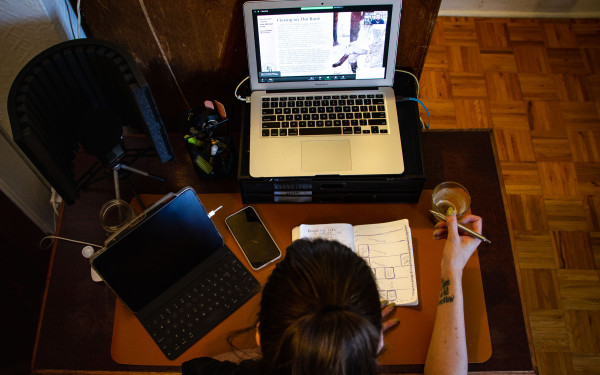Why We Need To Rethink Journalism and Education
I’m four years in and only six credits away from getting a degree specializing in both print and broadcast journalism.
At this point, the most honest piece of advice I can give anyone is: if you want to be a journalist, don’t assume journalism school is your best option.
The traditional model of j-school has gone stale, and simply does not serve as an effective platform upon which to build the practical and technical skills required to launch a career, or do the work required of today’s journalist.
I’ve had classmates, parents and professors tell me that if I want to be successful in the future, school ought to be my priority—but I disagree. Yes, I am a student journalist—but if I ever realistically want to find work, one of those two words is clearly going to get me further than the other.
On Monday, I applied for an internship at The Globe and Mail. The posting asked for a brief written blurb expressing what I could offer their publication, a resume outlining my relevant experience and an active link to three samples of work.
Nope, they didn’t care about my transcript, express any interest in my classwork, or even ask whether or not I was enrolled in a university program at all. The Gazette’s internship is due later this month, around the same time as the applications for the Toronto Star and Canadian Press—and none of them asked to see any of that either.
Editors and employers wants to see what you’ve done—so, if the goal is to become a journalist, then the process needs to involve working while learning. As of right now, you can theoretically get through three years of Concordia’s journalism program with straight ‘A’s while having only a single piece of writing published. That’s a problem.
Student media ought to be recognized by journalism schools—if not with class credit, then through facilitating and promoting it, rather than perpetuating the idea of “student first, journalist later.”
Isn’t it counterproductive that covering a protest is not considered a valid excuse for missing a reporting class?
This system penalizes people for practicing the exact skills that it’s theoretically attempting to teach them. It forces students to make a decision between getting the story and getting the grade—a dichotomy that needs to disappear.
We need to rethink and restructure the way the media is taught. A journalism education can’t be restricted to the realm of academia and confined within the walls of a classroom.
Yes, theory is important—absolutely. Journalists need fundamentals now as much as ever;knowing the ins and outs of media law, how to write a proper lede and follow a style guide are still necessary skills that a journalist can’t do without.
But no one needs three years of lectures and quizzes to learn those things. The basic pillars of journalism can be taught in an intensive course—one that can catapult students into a practical, real-time education, rather than being the extent of the learning experience.
Journalism is an art and a trade. You can’t teach a dancer how to pirouette by explaining physics and anatomy, nor can you teach a mechanic how to fix a car without ever bringing them into a garage. So, how can anyone expect a reporter to learn how to chase and file a breaking news story while sitting in a swivel chair in some far-off lecture hall? It simply can’t be done.
An article written by Len Downie from Harvard’s Nieman Journalism Lab suggested that journalism schools should mimic teaching hospitals. We should be following the example set by programs in line with the University of Toronto’s Monk School of Global Affairs, where the focus is placed on actually doing journalism instead of just talking about it.

_900_636_90.jpg)




